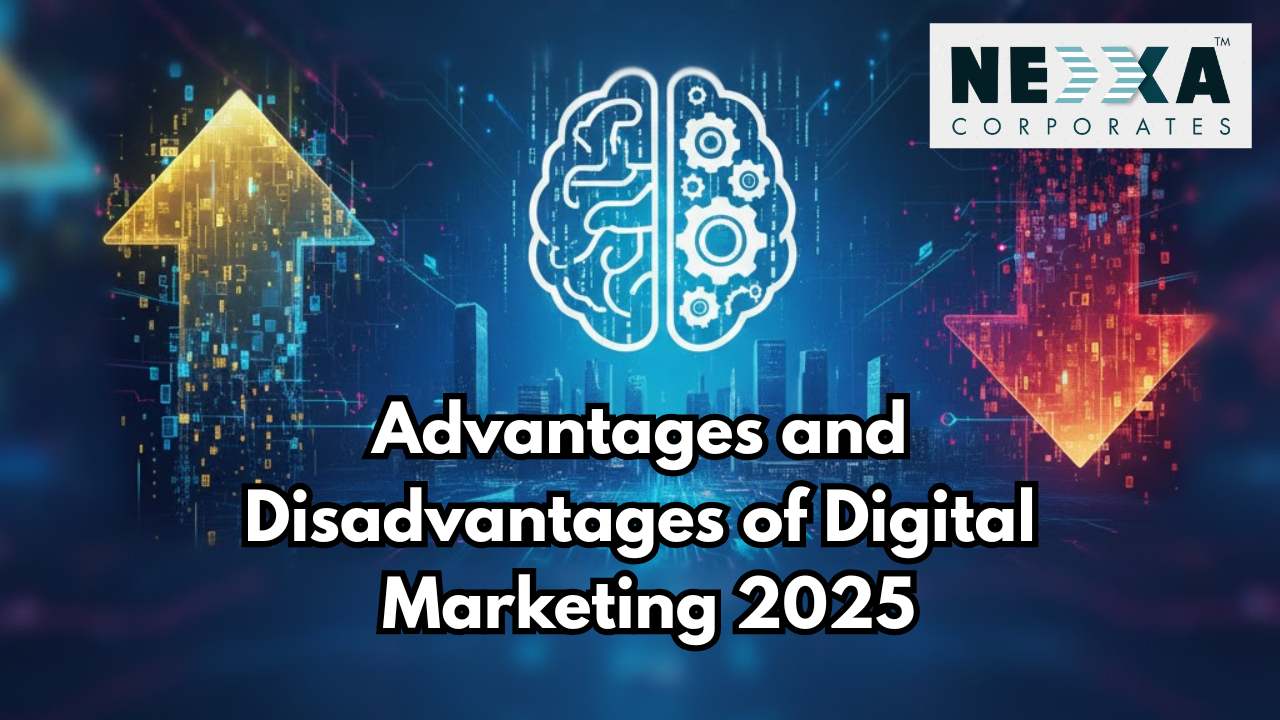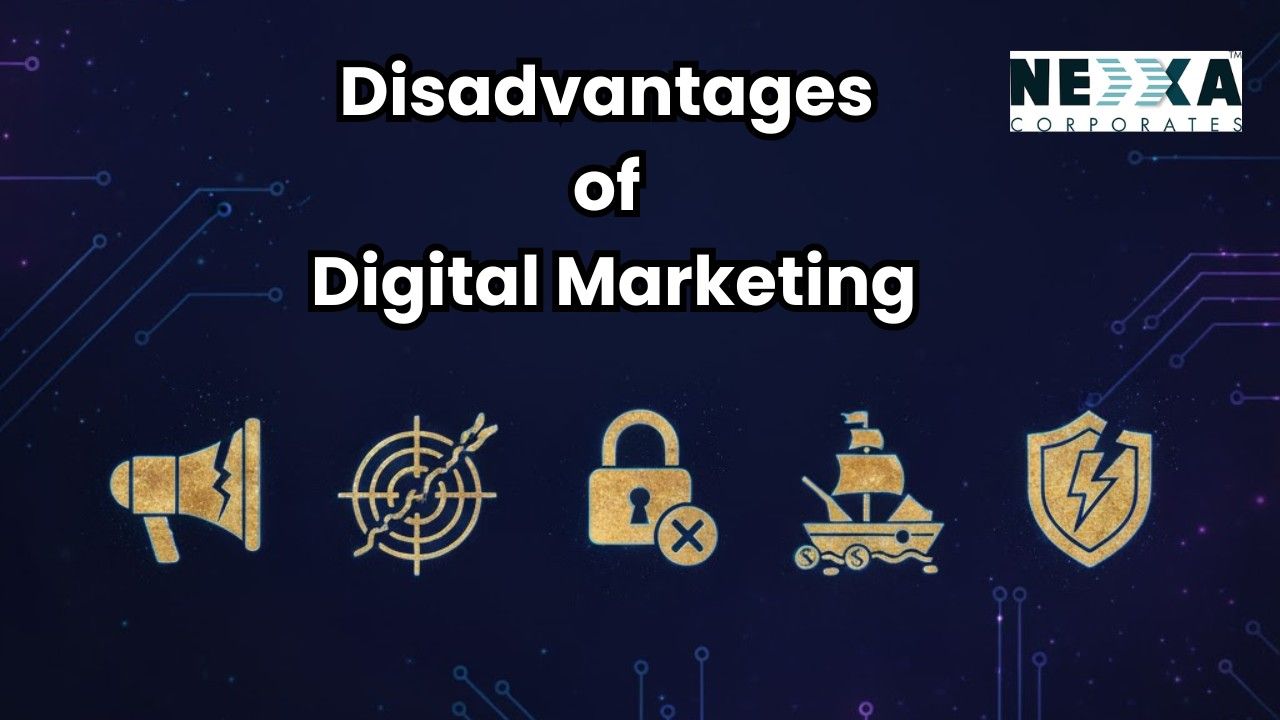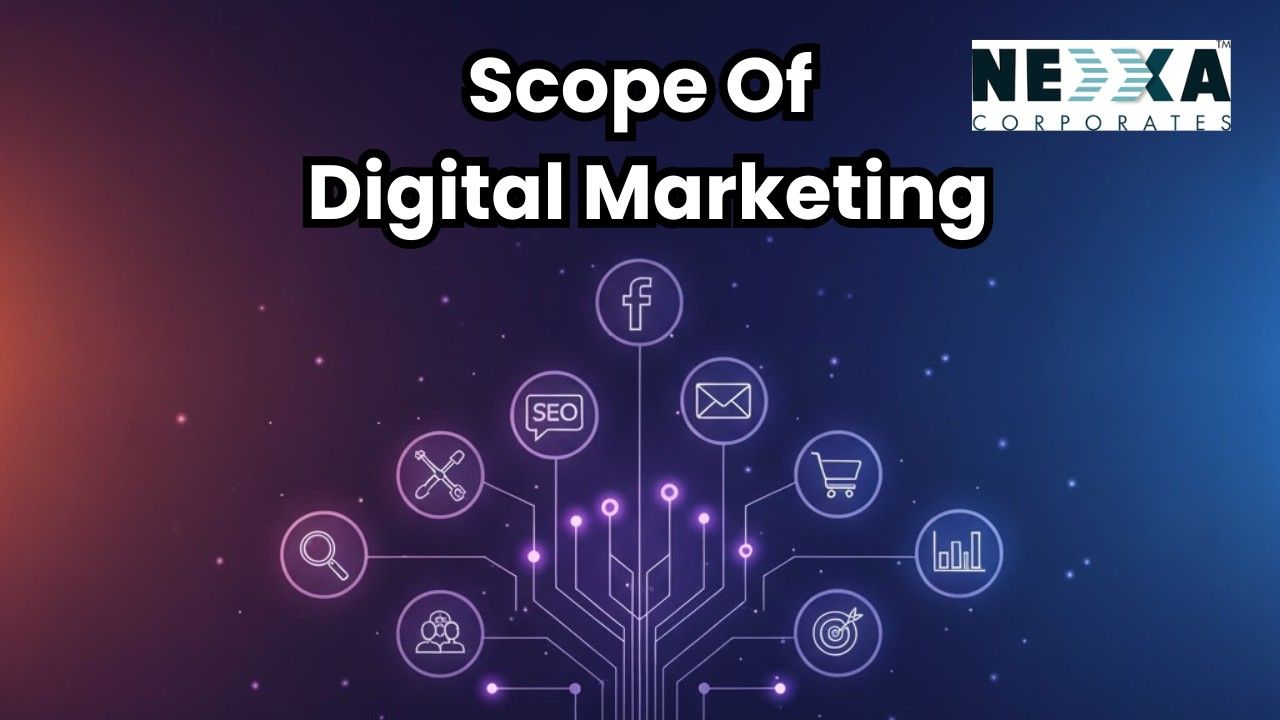Table of Contents
Advantages and Disadvantages of Digital Marketing in 2025- The Complete Guide for Business and Entrepreneurs

Digital marketing is the process of marketing through digital technologies and platforms. The main aim of digital marketing is to promote products, services, and brands. It connects businesses to customers through online channels like websites, social media, email marketing, search engines, and online video and content platforms.
There are many advantages and disadvantages of digital marketing. Digital Marketing is different from traditional Marketing.
Why is Digital Marketing important?
The importance of digital marketing is to reach the target audience, increase the sales of your business, and increase the profit of your business. There are some main reasons why digital marketing is important for your business.
Advantages and Disadvantages of Digital Marketing
Digital marketing has become one of the best ways to promote products and services through digital technologies. It helps businesses to reach people, raise brand awareness, and increase sales. Digital marketing has some advantages and disadvantages of digital marketing.
Here is a detailed explanation of the advantages and disadvantages of digital marketing
Top 10 Advantages of Digital Marketing
1. Global Reach
Digital marketing allows businesses to connect with people across the world easily. No matter where your customers are, you can reach them through social media, websites, or online ads. It removes distance barriers and helps even small businesses go international. This means your brand can grow faster and get more recognition without spending too much.
2. Cost-Effective marketing
Your content goes here. Edit or remove this text inline or in the module Content settings. You can also style every aspect of this content in the module Design settings and even apply custom CSS to this text in the module Advanced settings.
3. Targeted Audience Selection
Digital Marketing helps you reach the right audience. You can select your audience based on their age, location, and interests. It helps to save time and money because your message only goes to your customers who like your business. It helps to get real customers for your business, and also get the right customers at the right time with better results.
4. Measurable Results and Analytics
One of the best advantages of digital marketing is that you can analyze your results easily. Google Analytics and social media insights are those tools that help measure the results easily and show how many people saw and how many people clicked. This helps you to understand what is working well and what improvements are needed. Measurable Results and Analytics make marketing clearer and effective.
5. Higher Customer Engagement
Digital marketing makes it easy for businesses to connect and talk with customers directly. Through social media, emails, and websites, people can like, comment, share, or ask questions anytime. Regular posts, quick replies, and interesting content keep people engaged and excited. In short, high customer engagement turns normal visitors into loyal customers who support your business.
6. Strong Brand Development
Strong brand development means creating trust and recognition for your business online. By staying active, sharing useful content, and engaging with people, your brand becomes more visible and reliable.
7. Flexible and Easily Adjustable Campaigns
You can easily adjust your campaign in real time based on performance data, unlike print or TV, which are fixed once published. This flexibility allows businesses to respond to market trends, customer behaviour, or budget changes instantly, ensuring better results and reduced waste.
8. High Conversion Rate
Digital marketing helps turn more visitors into real customers. With the help of targeted ads and personalized content, you reach people who are already interested in what you offer. This increases the chances of conversion and helps your business grow faster. In simple terms, digital marketing makes it easier to turn online traffic into loyal buyers, improving your overall success.
9. Opportunities For All Business
Digital marketing gives equal opportunity to all businesses, big or small. It allows even new or local brands to reach a wide audience and compete with large companies. With the right strategy, any business can grow online and attract customers easily.
10. Faster Communication and Feedback
Digital marketing allows businesses to connect with customers instantly through emails, chats, and social media. It helps get quick feedback, answer questions fast, and build stronger relationships with customers.
Top 10 Disadvantages of Digital Marketing

1. High Competition in the Online Space
Digital marketing is open to everyone, which means almost every business is promoting online. Because of this, the internet is crowded with ads, posts, and promotions. Standing out from so many competitors can be tough, especially for new or small businesses. To get attention, your brand needs creative content and smart strategies.
2. Requires Technical Knowledge and Skills
Digital marketing requires proper understanding and skills. You should know how to run ads, use analytics tools, manage websites, and handle SEO. Without this knowledge, it can be hard to get good results. Learning these skills takes time and effort, mainly the technologies change fast. So you must stay updated and be ready to learn new things regularly.
3. Data Security and Private Concerns
In digital marketing, businesses collect customer data like emails, phone numbers, or buying habits to create better ads. But if this data is not protected properly, it can be misused or hacked. This raises serious privacy and security concerns for both businesses and customers. Keeping customer data safe and respecting privacy is very important to build trust and avoid problems.
4. Constantly Changing the Algorithms and Trends
Require an adaptable and audience-focused strategy, emphasizing high-quality, diverse content like short-form video, and leveraging data analytics.
5. Negative Feedback Can Go Public
One big drawback of digital marketing is that any negative comment or review can be seen by everyone online. If a customer is unhappy and posts it on social media, it can quickly spread and affect your brand’s image. Even one bad experience can reach thousands of people in minutes. In short, handling feedback with care can turn a bad situation into a chance to build trust.
6. Dependence on Internet Connectivity
It depends on the internet connection. If the user has a poor internet connection, your digital campaign won’t reach on time, which will affect ur business.
7. Time-Consuming Process
Digital marketing takes more time and effort to get good results. Creating good content, running ads, and managing social these all take more time. Building trust, gaining followers, and improving rankings happen slowly. That’s why digital marketing requires patience and planning.
8. Ad Fatigue Among Users
When people see the same ad too often, they lose interest or get annoyed. This lowers engagement and reduces the ad’s effectiveness over time.
9. Difficult To Build Trust for New Brands
In digital marketing, new brands struggle to gain trust because online users are doubtful of unfamiliar names. It takes consistent content, social proof, and positive engagement to build credibility and attract loyal customers.
10. Requires Continuous Monitoring
In digital marketing, campaigns need constant tracking and analysis to ensure they perform well. Marketers must regularly monitor metrics like clicks, conversions, and engagement to make quick adjustments and improve results.
Scope Of Digital Marketing

Digital marketing has completely changed the way businesses connect with people. Today, almost everyone uses the internet — and that’s where digital marketing plays a big role. It helps brands reach their audience faster, smarter, and at a lower cost. Whether it’s a small shop or a big company, digital marketing gives everyone a fair chance to grow online.
When we look at the advantages and disadvantages of digital marketing, one of the biggest advantages is its global business reach. You can promote your products or services to people across the world without even leaving your city. This means more visibility and more customers from different places.
It’s also cost-effective, so you don’t need to spend a huge amount like traditional marketing. Even with a small budget, you can reach thousands of people through social media, search engines, and emails.
It’s also cost-effective, so you don’t need to spend a huge amount like traditional marketing. Even with a small budget, you can reach thousands of people through social media, search engines, and emails.
With targeted advertising, you can choose exactly who should see your ads — based on their interests, location, or age. This helps you connect with people who are most likely to buy your product.
Another great thing is real-time performance tracking. You can easily check how your campaigns are performing — how many people clicked, visited, or bought something — and make quick changes if needed.
Digital marketing also helps improve brand awareness. When people keep seeing your brand online, they start recognizing and trusting it. This trust leads to better customer engagement, where customers talk, share feedback, and stay connected with your brand.
Finally, all these efforts lead to higher sales and conversions. When your brand is visible, trusted, and connected with the right audience, more people end up buying your products or services.
In short, the scope of digital marketing is huge. It’s a smart, affordable, and result-driven way to grow your business in today’s digital world.
Why To Choose Digital Marketing
Digital marketing is a smart and modern career choice because it offers high demand, skill development, and great opportunities to build a successful career. It helps businesses increase brand awareness and reach more people online. The field is creative, allowing you to design ads, write posts, and share ideas freely.
It’s also easy to manage, since you can track and improve campaigns anytime. Most importantly, it’s a great way to earn money through jobs, freelancing, or an online business. There are some advantages and disadvantages of digital marketing. In short, digital marketing is flexible, rewarding, and full of exciting growth opportunities.
Types of Digital Marketing

Here are the main 7 types of digital marketing
1. Search Engine Optimization (SEO)
2. Content Marketing
3. Social Media Marketing
4. Email Marketing
5. Pay Per Click(PPC) Advertising
6. Affiliate Marketing
7. Influence Marketing
1. Search Engine Optimization(SEO)
Search Engine Optimization is the process of improving the quality of website traffic to a website or a web page from search engines.
SEO is important because it brings free and organic traffic to your website. When your site ranks high, more people visit, trust your brand, and buy your products. It helps build credibility, brand awareness, and long-term online growth.
On-page SEO, Content SEO, Technical SEO, Off-page SEO and Local SEO are the types of SEO.
2. Content Marketing
Content marketing means creating useful and interesting content and sharing it to attract and connect with people. The main aim of content marketing is to build trust and give valuable information. It is done through blogs, social media posts, and email.
It helps to increase website traffic, build a strong relationship with customers, and build your brand. Good content makes visitors good customers.
Blog posts, videos, social media posts, email post letters, and podcasts are types of content marketing.
3. Social Media Marketing(SMM)
Social Media Marketing is the action of creating content to promote your business and products on various social media platforms such as Twitter, Facebook, and Instagram.
Your unique content should be tailored to the specific platforms its being shared on to help you boost conversions and increase brand awareness.
Facebook, Instagram, Twitter, and YouTube are examples of social media marketing.
4. Email Marketing
Email Marketing means sending a friendly email to customers to share offers, updates, and introduce our new product. It helps to build a strong relationship with the customers and stay connected with customers.
Email marketing helps to connect easily with customers directly in their inboxes. It helps increase sales, build trust with customers.
Newsletter emails, promotional emails, welcome emails, and customer retention emails are types of email marketing.
5. Pay Per Click(PPC) Advertising
Pay-Per-Click advertising, also called PPC, is a type of online marketing where you pay only when someone clicks on your ad. These ads usually appear on Google, YouTube, Facebook, or other websites. It’s a fast and effective way to get instant traffic to your website.
PPC helps businesses reach the right audience at the right time. It’s perfect for quick results, brand visibility, and targeted marketing. You can choose who sees your ad based on location, interest, or age group.
Search ads, display ads, video ads, shopping ads, social media ads, and remarketing ads are the types of PPC.
6. Affiliate Marketing
Affiliate Marketing is a type of online marketing where you earn money easily by promoting other companies’ products and earn a commission. The company gets sales and you can earn money by promoting it.
It is the easiest way to earn money at a low cost. It helps brands reach.
Unattached affiliate marketing, Related affiliate marketing, Involved affiliate marketing, and Influence affiliate marketing are the types of affiliate marketing.
7. Influencer Marketing
Influencer marketing means promoting your brand and products with influencers on social media like Instagram and YouTube.
It helps brands reach a larger and more trusted audience. People connect more with real faces than with normal ads. It builds brand awareness, trust, and quick engagement.
Sponsored posts, Giveaways, contests, and product reviews are types of influencer marketing.
In 2025, digital marketing has become a must for every business and entrepreneur. The scope of digital marketing is growing faster than ever, giving brands the power to reach customers all around the world.
When we look at the advantages and disadvantages of digital marketing, it’s clear that the benefits are far greater. It helps businesses build trust, improve brand awareness, and connect with people directly through different online channels.
Choosing digital marketing today means choosing a creative, flexible, and smart way to grow your business. From SEO and content marketing to email and influencer campaigns, the 7 types of digital marketing offer countless ways to promote products and services effectively.
Yes, digital marketing has a few challenges — like high competition and the need for continuous updates — but its advantages such as low cost, wide reach, and real-time performance tracking make it a powerful tool for long-term success.
In simple words, understanding the advantages and disadvantages of digital marketing helps every business make smarter decisions, adapt to trends, and build a strong online presence in 2025 and beyond.
FAQ
1. What is digital marketing?
Digital Marketing is the process of promoting products or servicesand a brand through digital channels. It includes the internet, mobile phones, and other digital media.
2. What are the main 5 advantages of digital marketing?
1. Global reach
2. Cost-efficient marketing
3. Targeted audience selection
4. Result monitoring
5. Higher customer engagement
3. How is digital marketing helpful for business?
Digital marketing helps businesses increase online visibility, build brand awareness, generate leads, and drive sales by reaching and engaging target audiences through online channels like websites, social media, and email.
4. How can I develop my brand using digital marketing?
create a unified brand identity and strategy, understand your audience, and use multiple channels like social media, content marketing, and email to engage them.
5. What is the role of digital marketing in business?
Digital marketing’s role is to attract and engage customers, build brand awareness, and drive sales by using online channels like websites, social media, and email.
